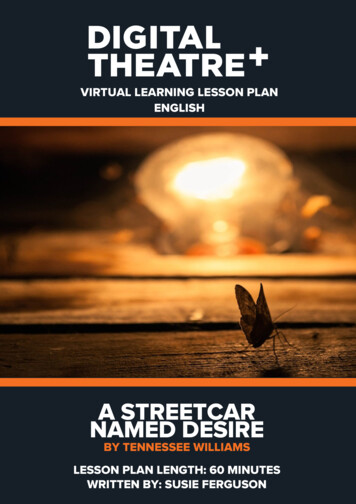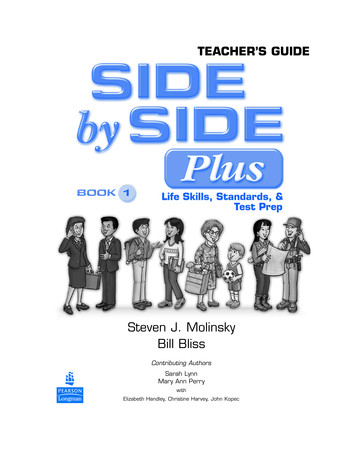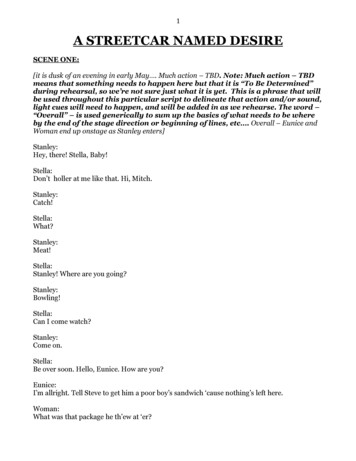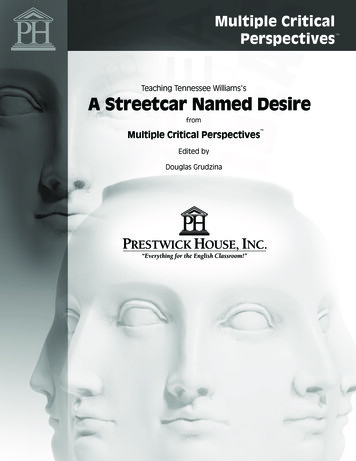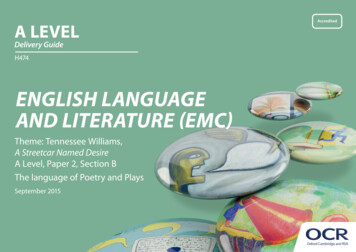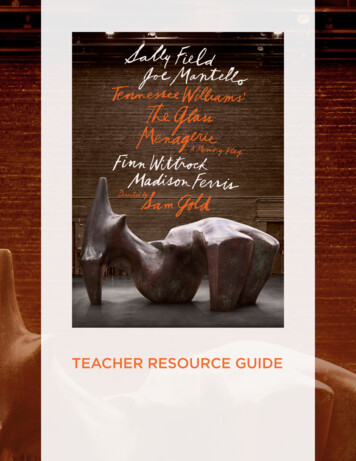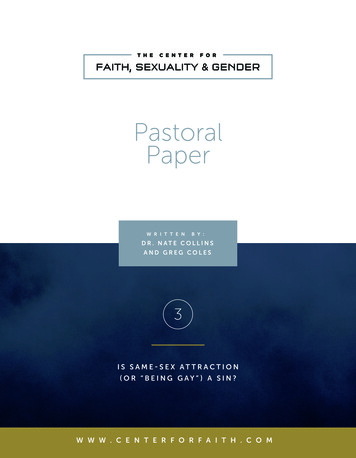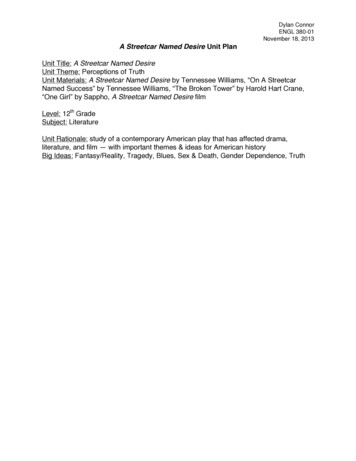
Transcription
Dylan ConnorENGL 380-01November 18, 2013A Streetcar Named Desire Unit PlanUnit Title: A Streetcar Named DesireUnit Theme: Perceptions of TruthUnit Materials: A Streetcar Named Desire by Tennessee Williams, “On A StreetcarNamed Success” by Tennessee Williams, “The Broken Tower” by Harold Hart Crane,“One Girl” by Sappho, A Streetcar Named Desire filmLevel: 12th GradeSubject: LiteratureUnit Rationale: study of a contemporary American play that has affected drama,literature, and film — with important themes & ideas for American historyBig Ideas: Fantasy/Reality, Tragedy, Blues, Sex & Death, Gender Dependence, Truth
Dylan ConnorENGL 380-01November 18, 2013Week 1Week 2Monday Anticipatory set: freewrite onperceptions vs. truth, activitywith newspaper articles Background on TennesseeWilliams (biographical/literaryhandout) Background on blues music(listen & discuss) Read “On A Streetcar NamedSuccess” aloud Give blank character list(handout) Assign New Orleans geographyworksheet Assign Scene One (and providetime to do so in groups) Go over Scenes Five & Six withReading Check quiz Read “One Girl” aloud (handout) Freewrite: Blanche & Stella asrelates to “One Girl” Watch A Streetcar NamedDesire through Scene Six Assign Scene Seven (andprovide time to do so in groups)Tuesday Go over New Orleansgeography & background Go over Scene One withquestions Powerpoint: scenic/light designs Read “Upstage” article, pg. 5-8 Watch A Streetcar NamedDesire through Scene One Assign Scene Two (and providetime to do so in groups) Go over Scene Seven withquestions Watch A Streetcar NamedDesire through Scene Seven Listen to “It’s Only A PaperMoon” in class, discuss lyrics(handout) Assign Scenes Eight & Nine(and provide time to do so ingroups)Wednesday Go over Scene Two withReading Check quiz Freewrite: Blanche & Stella’sthoughts about Stanley Powerpoint: costume designs Watch A Streetcar NamedDesire through Scene Two Assign Scene Three (andprovide time to do so in groups) Go over Scenes Eight & Ninewith questions Read “The Broken Tower” aloud(handout) Watch A Streetcar NamedDesire through Scene Nine Assign Scenes Ten & Eleven(and provide time to do so ingroups)
Dylan ConnorENGL 380-01November 18, 2013Week 1Week 2Thursday Go over Scene Three withquestions Powerpoint: sound designs Read “Upstage” article pg. 9-12 Watch A Streetcar NamedDesire through Scene Three Assign Scene Four (and providetime to do so in groups) Read Scene Eleven as a group Go over Scenes Ten & Elevenwith questions Play Seven-Card Stud in groups Watch A Streetcar NamedDesire through the end Discuss writing prompts &essay assignment due datesFriday Go over Scene Four withquestions Freewrite: Blanche & Stella’sthoughts about Stanley Watch A Streetcar NamedDesire through Scene Four Assign Scenes Five & Six (andprovide time to do so in groups) Go over test material, give studyconcepts orally in class Choose writing prompts (or getadditional prompts approved) Begin work in class withprewriting
Dylan ConnorENGL 380-01November 18, 2013Week 3Week 4Monday Continue prewriting,percolating, workshopping, etc. Prewriting/Brainstorming due atthe end of class Test day!Tuesday Work on rough draft in class Individual conferences witheach student Rough draft is due Peer-to-peer review Continue peer review andconduct another individualconference with each student Final draft is due! Present final papers Test review: discussion groups& review game WednesdayThursdayFridayBibliography Tennessee Williams 737/ New Orleans ion/mapping/outlinemap/?map Louisiana&ar a 1 “On A Streetcar Named eadthread/thread id/397593/ “Upstage” ire,-A Study-Guide.pdf “One Girl” by Sappho: http://www.poetryfoundation.org/poem/180686 “The Broken Tower” by Harold Hart Crane: by-Harold Hart Crane
Streetcar Unit - Common Core Expectations CCSS.ELA-Literacy.RL.11-12.1 Cite strong and thorough textual evidence tosupport analysis of what the text says explicitly as well as inferences drawn fromthe text, including determining where the text leaves matters uncertain. CCSS.ELA-Literacy.RL.11-12.2 Determine two or more themes or central ideasof a text and analyze their development over the course of the text, including howthey interact and build on one another to produce a complex account; provide anobjective summary of the text. CCSS.ELA-Literacy.RL.11-12.3 Analyze the impact of the author’s choicesregarding how to develop and relate elements of a story or drama (e.g., where astory is set, how the action is ordered, how the characters are introduced anddeveloped CCSS.ELA-Literacy.RL.11-12.4 Determine the meaning of words and phrases asthey are used in the text, including figurative and connotative meanings; analyzethe impact of specific word choices on meaning and tone, including words withmultiple meanings or language that is particularly fresh, engaging, or beautiful.(Include Shakespeare as well as other authors.) CCSS.ELA-Literacy.RL.11-12.5 Analyze how an author’s choices concerninghow to structure specific parts of a text (e.g., the choice of where to begin or enda story, the choice to provide a comedic or tragic resolution) contribute to itsoverall structure and meaning as well as its aesthetic impact. CCSS.ELA-Literacy.RL.11-12.6 Analyze a case in which grasping a point of viewrequires distinguishing what is directly stated in a text from what is really meant(e.g., satire, sarcasm, irony, or understatement). CCSS.ELA-Literacy.RL.11-12.7 Analyze multiple interpretations of a story,drama, or poem (e.g., recorded or live production of a play or recorded novel orpoetry), evaluating how each version interprets the source text. (Include at leastone play by Shakespeare and one play by an American dramatist.) CCSS.ELA-Literacy.RL.11-12.9 Demonstrate knowledge of eighteenth-,nineteenth- and early-twentieth-century foundational works of American literature,including how two or more texts from the same period treat similar themes ortopics.
“On A Streetcar Named Success”byTennessee Williams(This essay appeared in The New York Times Drama Section,November 30, 1947—four days before the New York openingof A Streetcar Named Desire.)Sometime this month I will observe the third anniversary of the Chicago opening of "TheGlass Menagerie," and even which terminated one part of my life and began anotherabout as different in all external circumstances as could be well imagined. I wassnatched out of a virtual oblivion and thrust into sudden prominence, and from theprecarious tenancy of furnished rooms about the country I was removed to a suite in afirst-class Manhattan hotel. My experience was not unique. Success has often comethat abruptly into the lives of Americans.No, my experience was not exceptional, but neither was it quite ordinary, and if you arewilling to accept the somewhat eclectic proposition that I had not been writing with suchan experience in mind--and many people are not willing to believe that a playwright isinterested in anything but popular success--there may be some point in comparing thetwo estates.The sort of life which I had had previous to this popular success was one that requiredendurance, a life of clawing and scratching along a sheer surface and holding on tightwith raw fingers to every inch of rock higher than the one caught hold of before, but itwas a good life because it was the sort of life for which the human organism is created.I was not aware of how much vital energy had gone into this struggle until the strugglewas removed. I was out on a level plateau with my arms still thrashing and my lungs stillgrabbing at air that no longer resisted. This was security at last.I sat down and looked about me and was suddenly very depressed. I thought to myself,this is just a period of adjustment. Tomorrow morning I will wake up in this first-classhotel suite above the discreet hum of an East Side boulevard and I will appreciate itselegance and luxuriate in its comforts and know that I have arrived at our American planof Olympus. Tomorrow morning when I look at the green satin sofa I will fall in love withit. It is only temporarily that the green satin looks like slime on stagnant water.But in the morning the inoffensive little sofa looked more revolting than the night beforeand I was already getting too fat for the 125 suit which a fashionable acquaintance hadselected for me. In the suite things began to break accidentally. An arm came off thesofa. Cigarette burns appeared on the polished surfaces of the furniture. Windows were
left open and a rainstorm flooded the suite. But the maid always put it straight and thepatience of the management was inexhaustible. Late parties could not offend themseriously. Nothing short of a demolition bomb seemed to bother my neighbors.I lived on room-service. But in this, too, there was a disenchantment. Sometimebetween the moment when I ordered dinner over the 'phone and when it was rolled intomy living room like a corpse on a rubber-wheeled table, I lost all interest in it. Once Iordered a sirloin steak and a chocolate sundae, but everything was so cunninglydisguised on the table that I mistook the chocolate sauce for gravy and poured it overthe sirloin steak. Of course all this was the more trivial aspect of a spiritual dislocationthat began to manifest itself in far more disturbing ways. I soon found myself becomingindifferent to people. A well of cynicism rose in me. Conversations all sounded like theyhad been recorded years ago and were being played back on a turntable. Sincerity andkindliness seemed to have gone out of my friends' voices. I suspected them ofhypocrisy. I stopped calling them, stopped seeing them. I was impatient of what I took tobe inane flattery.I got so sick of hearing people say, "I loved your play!" that I could not say thank youany more. I choked on the words and turned rudely away from the usually sincereperson. I no longer felt any pride in the play itself but began to dislike it, probablybecause I felt too lifeless inside ever to create another. I was walking around dead in myshoes, and I knew it but there was no one I knew or trusted sufficiently, at that time, totake him aside and tell him what was the matter.This curious condition persisted about three months, till late spring, when I decided tohave another eye operation, mainly because of the excuse it gave me to withdraw fromthe world behind a gauze mask. It was my fourth eye operation, and perhaps I shouldexplain that I had been afflicted for about five years with a cataract on my left eye whichrequired a series of needling operations and finally an operation on the muscle of theeye. (The eye is still in my head. So much for that.)Well, the gauze mask served a purpose. While I was resting in the hospital the friendswhom I had neglected or affronted in one way or another began to call on me and nowthat I was in pain and darkness, their voices seemed to have changed, or rather thatunpleasant mutation which I had suspected earlier in the season had now disappearedand they sounded now as they used to sound in the lamented days of my obscurity.Once more they were sincere and kindly voices with the ring of truth in them.When the gauze mask was removed I found myself in a readjusted world. I checked outof the handsome suite at the first-class hotel, packed my papers and a few incidentalbelongings and left for Mexico, and elemental country where you can quickly forget thefalse dignities and conceits imposed by success, a country where vagrants innocent aschildren curl up to sleep on pavements and human voices especially when theirlanguage is not familiar to the ear, are soft as birds'. My public self, that artifice of
mirrors, did not exist here and so my natural being was resumed.Then, as a final act of restoration, I settled for a while at Chapala to work on a playcalled "The Poker Night," which later became "A Streetcar Named Desire." It is only inhis work that an artist can find reality and satisfaction, for the actual world is less intensethan the world of his invention and consequently his life, without recourse to violentdisorder, does not seem very substantial. The right condition for him is that in which hiswork is not only convenient but unavoidable.This is an over-simplification. One does not escape that easily from the seductions of aneffete way of life. You cannot arbitrarily say to yourself, I will now continue my life as itwas before this thing. Success happened to me. But once you fully apprehend thevacuity of a life without struggle you are equipped with the basic means of salvation.Once you know this is true, that the heart of man, his body and his brain, are forged in awhite-hot furnace for the purpose of conflict (the struggle of creation) and that with theconflict removed, the man is a sword cutting daisies, that not privation but luxury is thewolf at the door and that the fangs of this wolf are all the little vanities and conceits andlaxities that Success is heir to--why, then with this knowledge you are at least in aposition of knowing where danger lies.You know, then, that the public Somebody you are when you "have a name" is a fictioncreated with mirrors and that the only somebody worth being is the solitary and unseenyou that existed from your first breath and which is the sum of your actions and so isconstantly in a state of becoming under your own volition--and knowing these things,you can even survive the catastrophe of Success!It is never altogether too late, unless you embrace the Bitch Goddess, as William Jamescalled her, with both arms and find in her smothering caresses exactly what thehomesick little boy in you always wanted, absolute protection and utter effortlessness.Security is a kind of death, I think, and it can come to you in a storm of royalty checksbeside a kidney-shaped pool in Beverly Hills or anywhere at all that is removed from theconditions that made you an artist, if that's what you are or were intended to be. Askanyone who has experienced the kind of success I am talking about--What good is it?Perhaps to get an honest answer you will have to give him a shot of truth-serum but theword he will finally groan is unprintable in genteel publications.Then what is good? The obsessive interest in human affairs, plus a certain amount ofcompassion and moral conviction, that first made the experience of living something thatmust be translated into pigment or music or bodily movement or poetry or prose oranything that's dynamic and expressive--that's what's good for you if you're at all seriousin your aims. William Saroyan wrote a great on this theme, that purity of heart is the onesuccess worth having. "In the time of your life--live!" That time is short and it doesn'treturn again. It is slipping away while I write this and while you read it, and the
monosyllable of the clock is Loss, Loss, Loss unless you devote your heart to itsopposition.
Streetcar Character List(function, goal(s), obstacle(s), tactics, expectations) Blanche DuBois - Stella Kowalski - Stanley Kowalski - Mitch - Eunice - Steve - Pablo - A Negro Woman - A Mexican Woman - A Young Collector - A Doctor -
About New OrleansWhere inNew Orleans? Elysian Fields Avenue L & N tracks “the river” The French Quarter Preservation Hall Lake Pontchartrain Bourbon Street Desire Street Canal Street -
Streetcar Unit - Thought Questions Choose a character to analyze from an actor’s perspective. What are your charactersgoals, obstacles, tactics, expectations? Choose two scenes in which your characterappears to annotate and demonstrate beat-shifts in the text. Compare Stanley’s view of Stanley with his view of Blanche. Use specific textexamples. How do these specific relationships inform his overall view of women? Come up with a design concept for the play, and demonstrate your overall vision forscenic, costume, lighting, and sound. Explain how it would interact with the text. What is the dichotomy between reality & Blanche’s perception of it? Use specificexamples from the text. Where do you think this comes from? Choose a line of dialogue from the play to go with each of Hart Crane’s poem “BrokenTower,” and create a visual representation of these connections. What is the connection between sex and death in the play? Use specific examplesfrom the text. How does this inform Tennessee Williams’ worldview? Write a short play involving at least two of the characters from Streetcar. You maywrite a scene set before, after, or during the action of the play. Analyze the differences between the film & the play. Tennessee Williams wrote both— why did he choose to include certain differences? If you were developing a movieversion, what would you change?
About Tennessee WilliamsHe was brilliant and prolific, breathing life and passion into such memorablecharacters as Blanche DuBois and Stanley Kowalski in his critically acclaimed ASTREETCAR NAMED DESIRE. And like them, he was troubled and selfdestructive, an abuser of alcohol and drugs. He was awarded four Drama CriticCircle Awards, two Pulitzer Prizes and the Presidential Medal of Freedom. Hewas derided by critics and blacklisted by Roman Catholic Cardinal Spellman, whocondemned one of his scripts as “revolting, deplorable, morally repellent,offensive to Christian standards of decency.” He was Tennessee Williams, one ofthe greatest playwrights in American history.Born Thomas Lanier Williams in Columbus, Mississippi in 1911, Tennessee wasthe son of a shoe company executive and a Southern belle. Williams describedhis childhood in Mississippi as happy and carefree. This sense of belonging andcomfort were lost, however, when his family moved to the urban environment ofSt. Louis, Missouri. It was there he began to look inward, and to write— “becauseI found life unsatisfactory.” Williams’ early adult years were occupied withattending college at three different universities, a brief stint working at his father’sshoe company, and a move to New Orleans, which began a lifelong love of thecity and set the locale for A STREETCAR NAMED DESIRE.1
About Tennessee WilliamsWilliams spent a number of years traveling throughout the country and trying towrite. His first critical acclaim came in 1944 when THE GLASS MENAGERIEopened in Chicago and went to Broadway. It won a the New York Drama Critics’Circle Award and, as a film, the New York Film Critics’ Circle Award. At the heightof his career in the late 1940s and 1950s, Williams worked with the premierartists of the time, most notably Elia Kazan, the director for stage and screenproductions of A STREETCAR NAMED DESIRE, and the stage productions ofCAMINO REAL, CAT ON A HOT TIN ROOF, and SWEET BIRD OF YOUTH.Kazan also directed Williams’ film BABY DOLL. Like many of his works, BABYDOLL was simultaneously praised and denounced for addressing raw subjectmatter in a straightforward realistic way.The 1960s were perhaps the most difficult years for Williams, as he experiencedsome of his harshest treatment from the press. In 1961 he wrote THE NIGHT OFTHE IGUANA, and in 1963, THE MILK TRAIN DOESN’T STOP HERE ANYMORE. His plays, which had long received criticism for openly addressing tabootopics, were finding more and more detractors. Around this time, Williams’longtime companion, Frank Merlo, died of cancer. Williams began to dependmore and more on alcohol and drugs and though he continued to write,completing a book of short stories and another play, he was in a downwardspiral. In 1969 he was hospitalized by his brother.After his release from the hospital in the 1970s, Williams wrote plays, a memoir,poems, short stories and a novel. In 1975 he published MEMOIRS, whichdetailed his life and discussed his addiction to drugs and alcohol, as well as hishomosexuality. In 1980 Williams wrote CLOTHES FOR A SUMMER HOTEL,based on the lives of Zelda and F. Scott Fitzgerald. Only three years later,Tennessee Williams died in a New York City hotel filled with half-finished bottlesof wine and pills. It was in this desperation, which Williams had so closely knownand so honestly written about, that we can find a great man and an importantbody of work. His genius was in his honesty and in the perseverance to tell hisstories.2
A Streetcar Named Desire Scene TwoReading Check1. What is Belle Reve?2. What is the Napoleonic Code, and why does it matter to Stanley?3. What explanation does Blanche give for having lost Belle Reve?4. What does Stanley reveal to Blanche at the end of the scene?
A Streetcar Named Desire Scenes Five & SixReading Check1. Why does Eunice threaten to call the police? What does she do instead?2. Describe Blanche’s interactions with the Young Man.3. What happened to Blanche’s husband? Why?
“One Girl” by SapphoTranslated by Dante Gabriel RossettiILike the sweet apple which reddens upon the topmost bough,Atop on the topmost twig, — which the pluckers forgot, somehow, —Forget it not, nay; but got it not, for none could get it till now.IILike the wild hyacinth flower which on the hills is found,Which the passing feet of the shepherds for ever tear and wound,Until the purple blossom is trodden in the ground.
“The Broken Tower” by Harold Hart CraneThe bell-rope that gathers God at dawnDispatches me as though I dropped down the knellOf a spent day - to wander the cathedral lawnFrom pit to crucifix, feet chill on steps from hell.Have you not heard, have you not seen that corpsOf shadows in the tower, whose shoulders swayAntiphonal carillons launched beforeThe stars are caught and hived in the sun's ray?The bells, I say, the bells break down their tower;And swing I know not where. Their tongues engraveMembrane through marrow, my long-scattered scoreOf broken intervals And I, their sexton slave!Oval encyclicals in canyons heapingThe impasse high with choir. Banked voices slain!Pagodas, campaniles with reveilles out leapingO terraced echoes prostrate on the plain! And so it was I entered the broken worldTo trace the visionary company of love, its voiceAn instant in the wind (I know not whither hurled)
But not for long to hold each desperate choice.My word I poured. But was it cognate, scoredOf that tribunal monarch of the airWhose thigh embronzes earth, strikes crystal WordIn wounds pledged once to hope - cleft to despair?The steep encroachments of my blood left meNo answer (could blood hold such a lofty towerAs flings the question true?) -or is it sheWhose sweet mortality stirs latent power?-And through whose pulse I hear, counting the strokesMy veins recall and add, revived and sureThe angelus of wars my chest evokes:What I hold healed, original now, and pure And builds, within, a tower that is not stone(Not stone can jacket heaven) - but slipOf pebbles, - visible wings of silence sownIn azure circles, widening as they dipThe matrix of the heart, lift down the eyeThat shrines the quiet lake and swells a tower The commodious, tall decorum of that sky
Unseals her earth, and lifts love in its shower.
"It's Only A Paper Moon"It’s only a paper moonSailing over a cardboard seaBut it wouldn't be make believeIf you believed in meYes, it's only a canvas skyHangin' over a muslin treeBut it wouldn't be make believeIf you believed in meWithout your loveIt's a honky tonk paradeWithout your loveIt's a melody played in a penny arcadeIt's a Barnum and Bailey worldJust as phony as it can beBut it wouldn't be make believeIf you believed in meWithout your loveIt's a honky tonk paradeWithout your loveIt's a melody played in a penny arcadeIt's a Barnum and Bailey worldJust as phony as it can beBut it wouldn't be make believeIf you believed in me
Desire through Scene Six Assign Scene Seven (and provide time to do so in groups) Tuesday Go over New Orleans geography & background Go over Scene One with questions Powerpoint: scenic/light designs Read "Upstage" article, pg. 5-8 Watch A Streetcar Named Desire through Scene One Assign Scene Two (and provide
